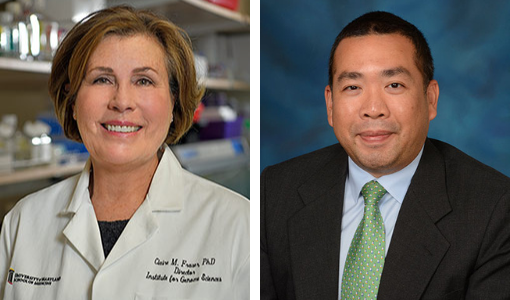New Research Studies Health of HIV-Positive Moms’ Infants
Babies born to women with HIV often have poorer health and underdeveloped growth in the early months of life than infants born to women without the infection — even if those babies don’t contract HIV during birth, according to a new study by researchers at the University of Maryland School of Medicine’s (UMSOM) Institute for Genome Sciences (IGS) and Institute of Human Virology (IHV). The study also provides new insights into why these health issues often continue throughout the babies’ lives.

Claire Fraser and Man Charurat
Science has come far in preventing HIV transmission from mother to baby, thanks to the standard use of antiretroviral therapy (ART) for HIV-positive pregnant women. However, babies of HIV-positive mothers still struggle with slower growth and adverse health outcomes.
In the study published online in April in Microbiome, IGS and IHV scientists found a complex interaction of factors shaped babies’ development and health. These included maternal HIV status, infants’ gut microbiota, the length of time that mothers breastfed, and the breastmilk composition.
For 18 months, study leaders Claire Fraser, PhD, the Dean’s Endowed Professor of Medicine at UMSOM and director of IGS, and Man Charurat, PhD, MHS, professor of medicine at UMSOM and the division director of epidemiology and prevention at IHV, along with colleagues, followed a group of 272 Nigerian babies born to mothers with and without HIV. All mothers with HIV in this study were being treated with ART, and none transmitted the virus to their newborns.
Surprisingly, the researchers found no significant differences between the gut and vaginal microbiomes of the mothers with and without HIV, as well as no difference in the gut microbiomes of the babies at birth. Infants born to mothers with HIV exhibited lower weight-to-age Z-scores (WAZ) at birth in comparison to infants born to uninfected mothers. The Z-score measures the distance away from a particular data point. These differences persisted throughout the 18-month study and were further exacerbated in infants who were not breastfed.
The World Health Organization recommends that HIV-positive mothers breastfeed exclusively for six months and continue to nurse, along with solid food, for up to two years. The Fraser/Charurat team discovered that by six months, 99 percent of mothers without HIV were still breastfeeding, but only 39 percent of mothers with HIV were breastfeeding. The numbers became even more discrepant at nine months: 95 percent of mothers without HIV still breastfed their infants, and only 17 percent of mothers with HIV were still breastfeeding.
“We’ve long known that the composition of the gut microbiome in infants impacts their overall health, growth, and development. That composition is strongly influenced by what the babies eat early in life,” Fraser said.
Scientists know that the gastrointestinal tracts of healthy breastfed infants are filled with the bacteria Bifidobacterium. The loss of this — or invasion of other types of bacteria — can predispose an infant to metabolic and autoimmune diseases throughout life.
“We wondered whether the lack of breastfeeding in infants of HIV-positive mothers during the first weeks and months postpartum was associated with a lower abundance of Bifidobacteria and, in fact, we found significantly less of that genus in non-breastfed babies,” Fraser explained. “We also thought that lower amount might impact a baby’s weight, and, again, low Bifidobacteria led to lower infant weight.”
Is it how long a baby receives breastmilk, or is it the content that makes a difference?
“It seems that it is both,” Fraser said. “There’s a difference in growth between babies of mothers with HIV who were breastfed longer and those who stopped early on. We discovered that the presence of ART in breastmilk correlated with a lower abundance of Bifidobacteria in the infant gut microbiome as well.”
Researchers don’t know whether the ART drug metabolites directly impact Bifidobacteria levels.
“It seems that breastfeeding helps close the gap between the babies in the two different groups,” Fraser explained. “It may mean that breastmilk containing ART metabolites may be less than ideal — perhaps ART is directly toxic to some of the gut microbes.”
Fraser said the use of Bifidobacterium probiotic supplement may be one way to help strengthen the gut — and ultimately reduce disease — in babies born to mothers with HIV. A stronger gut, then, could reduce ongoing poor growth and mortality among those infants.
“We recognize there are other confounding factors, like available food choices in impoverished areas, that could play a role in this complex interaction between mothers with HIV and their newborns’ health,” Charurat added. “We will be taking a deeper dive into this research.”
E. Albert Reece, MD, PhD, MBA, executive vice president for medical affairs, University of Maryland, Baltimore (UMB), the John Z. and Akiko K. Bowers Distinguished Professor, and dean at UMSOM, said, “This research is critical to allow babies born to mothers with HIV to thrive alongside their peers whose mothers have not contracted HIV.”
The research reported in this publication was supported by the National Institute of Dental and Craniofacial Research of the National Institutes of Health under Award Number R01DE025174. Additional support was provided by the Dean’s Endowed Professorship to Fraser. Olivia A. Martin is a TL1 postdoctoral fellow supported by 1TL1TR003100‐01, 1UL1TR003098‐01, and the UMB Institute for Clinical and Translational Research.
The authors have no conflicts of interest.



